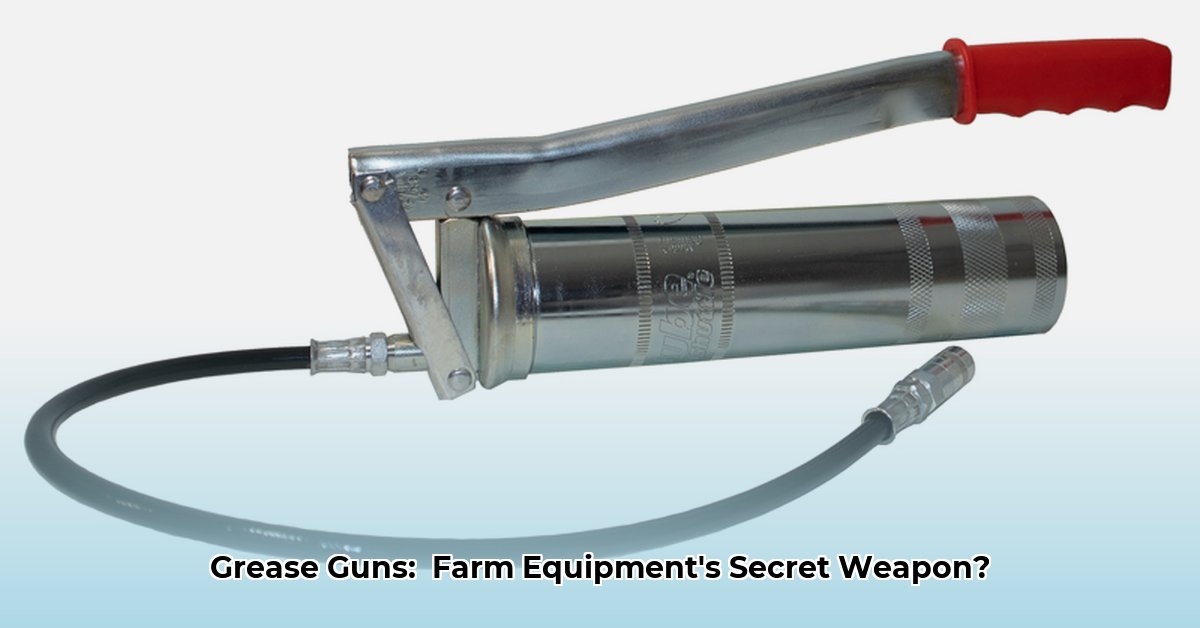
Choosing the right grease gun can significantly impact your farm's efficiency and equipment lifespan. This guide compares different grease gun types, outlining their strengths and weaknesses to help you select the ideal tool for your needs. We'll delve into the technical aspects, offering actionable advice for optimal grease gun selection and maintenance. For more information on grease guns available at Tractor Supply, check out this helpful resource.
Understanding Your Greasing Needs: Frequency & Scale
Before diving into specific models, honestly assess your greasing requirements. How often will you use the grease gun? Daily maintenance on a large fleet demands a different tool than occasional upkeep on a few smaller pieces of equipment. Consider the number of grease points on your equipment—a larger operation requires a more powerful and efficient solution. "Choosing the right grease gun is crucial for efficient farm maintenance," says Dr. Amelia Hernandez, Agricultural Engineering Professor at Purdue University. This initial assessment will significantly influence your choice.
Different Grease Guns for Different Jobs: A Comparative Review
Several types of grease guns cater to various needs. Each option presents a unique balance of cost, efficiency, and ease of use. Let's compare the key contenders:
| Grease Gun Type | Pros | Cons | Best Suited For |
|---|---|---|---|
| Lever-Action | Simple, inexpensive, reliable, easy to maintain, requiring minimal skill. | Labor-intensive for large jobs; slow greasing process; can be tiring for extended use. | Occasional greasing; smaller equipment; budget-conscious users. |
| Pistol Grip | Easier to use than lever-action; better control; less tiring than lever-action; improved ergonomics. | Still manual; can become tiring with frequent use or large-scale greasing tasks. | Regular greasing; medium-sized equipment; users seeking a balance of ease and power. |
| Air-Powered | Powerful; fast; ideal for large volumes; consistent pressure; high efficiency. | Requires an air compressor; reduced portability; can be noisy; higher initial investment. | Large-scale operations; frequent, high-volume greasing; workshops; demanding applications. |
| Battery-Powered/Cordless | Portable; powerful; less tiring; convenient; suitable for remote locations. | Requires charging; battery life may vary; typically more expensive than manual options. | Frequent use; various equipment sizes; remote locations; users prioritizing convenience. |
Seasonal Considerations and Grease Viscosity
Remember that grease viscosity (thickness) changes with temperature. Thicker grease, common in cold weather, might require a more powerful grease gun to dispense effectively. Consider your climate and the viscosity of the grease you'll be using when making your decision. "In colder climates, a higher-pressure grease gun can be a game-changer," notes Mark Olsen, Chief Mechanic at Olsen Farms. This often overlooked factor helps prevent costly delays.
Making the Right Choice: A Step-by-Step Guide
Choosing the best grease gun involves careful consideration of various factors. Utilize this structured approach for optimal decision-making:
Assess your needs: How frequently will you grease equipment? How many grease points are there? What's the size of your operation? (This helps determine the required power and capacity).
Set a budget: Manual guns are most budget-friendly, while powered options increase in cost with added features.
Research Models: Research and compare models within your budget range, focusing on features like pressure, couplers (LockNLube is recommended for cleanliness), accessories (extensions, flexible hoses), and power source.
Read Reviews: Consult independent reviews from other farmers and mechanics to gauge user experiences and identify potential issues with specific models. This helps navigate the features and benefits of various options.
Make your purchase: Purchase your selected grease gun from a reputable dealer to ensure warranty coverage and access to support.
Maintaining Your Grease Gun: Essential Tips for Longevity
Proper maintenance significantly extends the lifespan of your grease gun. Clean the gun thoroughly after each use, paying particular attention to removing old grease and debris. Store it in a dry location to protect against rust and corrosion. "Regular maintenance is key to preventing costly downtime," adds John Davis, owner of Davis Equipment Repair. These simple steps can save you money and frustration in the long run.
Choosing the right grease gun is a critical investment for any farm operation. By weighing the factors presented here and using this guide as a framework for your own assessment, you can find the perfect grease gun to keep your machinery running smoothly and efficiently, year after year.